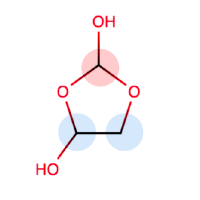__init__(self[, other, file_format, …])
|
Create a new FrozenMolecule object |
chemical_environment_matches(self, query[, …])
|
Retrieve all matches for a given chemical environment query. |
compute_partial_charges(self[, toolkit_registry])
|
Warning! Not Implemented! Calculate partial atomic charges for this molecule using an underlying toolkit |
compute_partial_charges_am1bcc(self[, …])
|
Calculate partial atomic charges for this molecule using AM1-BCC run by an underlying toolkit |
compute_wiberg_bond_orders(self[, …])
|
Calculate wiberg bond orders for this molecule using an underlying toolkit |
from_bson(serialized)
|
Instantiate an object from a BSON serialized representation. |
from_dict(molecule_dict)
|
Create a new Molecule from a dictionary representation |
from_file(file_path[, file_format, …])
|
Create one or more molecules from a file |
from_iupac(iupac_name, \*\*kwargs)
|
Generate a molecule from IUPAC or common name |
from_json(serialized)
|
Instantiate an object from a JSON serialized representation. |
from_messagepack(serialized)
|
Instantiate an object from a MessagePack serialized representation. |
from_openeye(oemol[, allow_undefined_stereo])
|
Create a Molecule from an OpenEye molecule. |
from_pickle(serialized)
|
Instantiate an object from a pickle serialized representation. |
from_rdkit(rdmol[, allow_undefined_stereo])
|
Create a Molecule from an RDKit molecule. |
from_smiles(smiles[, …])
|
Construct a Molecule from a SMILES representation |
from_toml(serialized)
|
Instantiate an object from a TOML serialized representation. |
from_topology(topology)
|
Return a Molecule representation of an openforcefield Topology containing a single Molecule object. |
from_xml(serialized)
|
Instantiate an object from an XML serialized representation. |
from_yaml(serialized)
|
Instantiate from a YAML serialized representation. |
generate_conformers(self[, …])
|
Generate conformers for this molecule using an underlying toolkit |
get_bond_between(self, i, j)
|
Returns the bond between two atoms |
get_fractional_bond_orders(self[, method, …])
|
Get fractional bond orders. |
is_isomorphic(self, other[, …])
|
Determines whether the molecules are isomorphic by comparing their graphs. |
to_bson(self)
|
Return a BSON serialized representation. |
to_dict(self)
|
Return a dictionary representation of the molecule. |
to_file(self, file_path, file_format[, …])
|
Write the current molecule to a file or file-like object |
to_iupac(self)
|
Generate IUPAC name from Molecule |
to_json(self[, indent])
|
Return a JSON serialized representation. |
to_messagepack(self)
|
Return a MessagePack representation. |
to_networkx(self)
|
Generate a NetworkX undirected graph from the Molecule. |
to_openeye(self[, aromaticity_model])
|
Create an OpenEye molecule |
to_pickle(self)
|
Return a pickle serialized representation. |
to_rdkit(self[, aromaticity_model])
|
Create an RDKit molecule |
to_smiles(self[, toolkit_registry])
|
Return a canonical isomeric SMILES representation of the current molecule |
to_toml(self)
|
Return a TOML serialized representation. |
to_topology(self)
|
Return an openforcefield Topology representation containing one copy of this molecule |
to_xml(self[, indent])
|
Return an XML representation. |
to_yaml(self)
|
Return a YAML serialized representation. |
 Open Force Field Toolkit
0.6.0
Open Force Field Toolkit
0.6.0